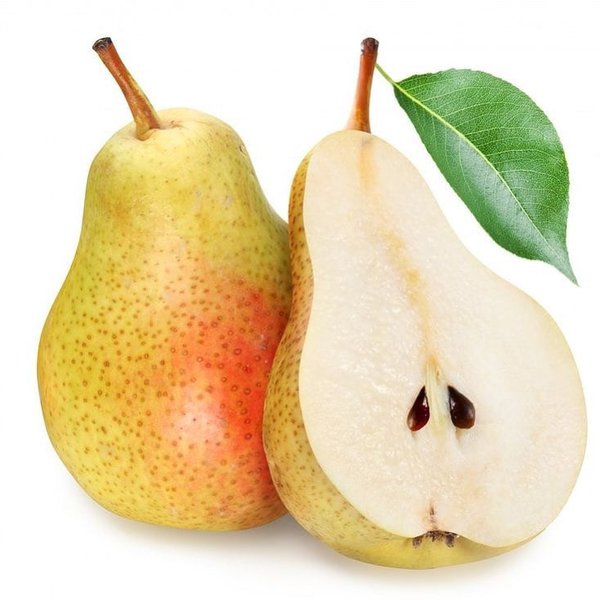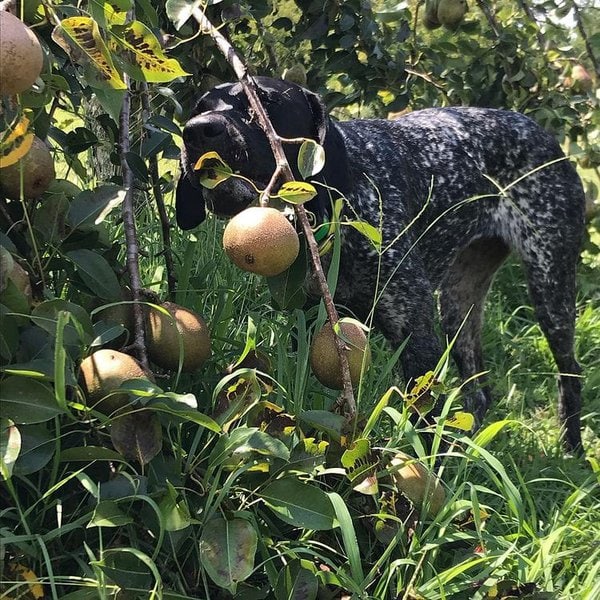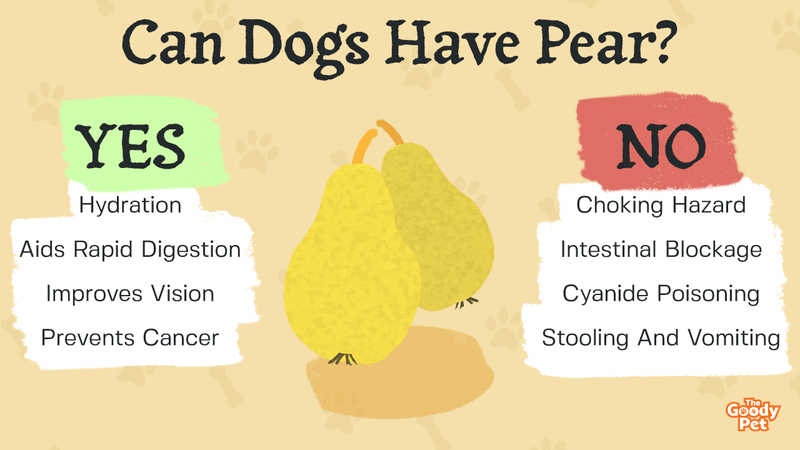Pears are soft, delicious, and easy to digest, but the single most important quality that makes pears universally acceptable is that they rarely cause allergies in humans. But are dogs allergic to pears? Can dogs consume pears, Asian pears inclusive, without repercussion?
Yes, dogs can eat pears, including Asian pears, because they are soft and pack so many nutritional benefits that they can easily pass as one of the healthiest fruit treats for dogs. Despite being safe, when consumed incorrectly, these fruits could cause indigestion and cyanide poisoning, leading to death in dogs.
Hence, if you’re looking to learn the many benefits of feeding pears to dogs and, more importantly, how to feed pears to dogs the right way, continue reading.
You’ll learn why pears are so beneficial, the dangers of feeding pear wrongly to dogs, whether dogs can eat pears unpeeled, and the dangers of dogs eating salted or canned pears.
What Are The Benefits Of Feeding Dogs Pears?

As a treat, pears come highly recommended because of their immense benefits to dogs, so here’s a list of these benefits:
Hydration And Osmoregulation
Pears have between 80 to 85% water content which serves as an alternative way of keeping a dog hydrated, especially in places like the beach where freshwater isn’t easily accessible.
In addition, the high moisture level helps in osmoregulation, which is the balance of salt to water ratio in your canine’s system.
Aids Rapid Digestion And Bowel Movement
Pears, like other fruits, are rich in fiber that eases and speeds up the digestion of food in dogs. The health significance here is quick bowel movement and the expulsion of toxins that would otherwise have stayed longer in your pooch’s body system.
The fiber also encourages the multiplication of healthy bacteria in dogs’ guts, which helps break down other harmful pathogens, consequently boosting the immune system.
Improves Vision And Boosts Immunity
Pears contain vitamins that improve the overall well-being of your canine pal. For example, vitamin A in pears bestows a dog with good eyesight and sharp vision. Also contained in pears is vitamin C, which helps fortify the immune system and prevent illnesses.
Prevents Cancer
The foremost compounds that prevent cancer in living things are antioxidants, and they abound plentifully in pears. Antioxidants like anthocyanins and flavonoids limit the occurrence of free radicals, thereby stopping the rise of cancer cells in dogs.
Can Pears Be Dangerous To Dogs?

Yes, pears can be dangerous to dogs if fed in the wrong way.
Here’s a list of some ugly health complications that could arise when dogs eat pears without caution.
Choking Hazard
Pears are large fruits that present an increased risk of choking hazards in dogs. In addition, the sheer size of this fruit makes it difficult for dogs to swallow if it isn’t cut into smaller pieces. The need to reduce pears into cube-sized pieces is even more critical if you’d be feeding them to smaller dog breeds like the Yorkshire Terrier or the Toy Poodle.
In addition, the pit in a pear fruit could also constitute a choking hazard in your furry buddy. Hence the best way to avoid the possibility of throat or gut obstruction in your canine pal is to slice up pears and take out pits before feeding.
Intestinal Blockage
If your canine swallows chunks of a pear fruit, it may luckily force them down, but such large pieces can pass through the stomach undigested and clog the intestines. The phenomenon is quite ugly and causes unbearable pain and discomfort for both dog and dog owners.
Intestinal blockage, in severe cases, requires surgery which is a stressful procedure that could easily be avoided by cutting up pears into minute pieces.
Cyanide Poisoning
Cyanide poisoning could end a dog’s life within minutes, and pears harbor these toxic compounds within the soft walls of the fruit. Ordinarily, the pit of a pear fruit isn’t of edible interest to your pooch, but because dogs have a natural tendency to bite and chew objects, they mostly begin a ‘bite fight’ on pear pits sometimes, to their death.
Cyanide is an extremely toxic substance notoriously famous for bonding with cells and depleting oxygen usage. This toxin more or less places a chokehold on cells that transport oxygen in your dear Fido’s body, ultimately causing massive mortality at a cellular level.
Symptoms of cyanide poisoning include elevated heart rate, restlessness, panting, confusion, loss of consciousness, and in severe cases, death.
Keep in mind that your four-legged pal doesn’t have to completely swallow the pit in a pear. As long as a considerable amount of cyanide is ingested, with enough toxin within a half-chewed pit, there might be trouble.
Stooling And Vomiting
Fiber, originally meant to assist digestion and speed up bowel movement, overdoes the job and induces excessive stooling when your furry pal eats pears without discretion.
The uncontrolled toilet visits or persistent vomiting cause dehydration and drain nutrients in dogs, weakening their immune systems and making them incredibly vulnerable to attacks.
Obesity
Ideally, pears aren’t supposed to cause obesity in your beloved four-legged buddy because they contain low sugar, but when obesity-prone dogs eat too many pears, they may gain massive weight in a short period.
How To Safely Feed Pears To Dogs?
Ensuring the safety of your dear Fido while feeding pears only requires you to follow some general precautions mentioned below:
Feed Ripe Pears Only
An unripe pear is hard and difficult to chew and would create a choking hazard, especially for smaller dogs. When you present unripe pears to your pooches, you force them to strain while chewing the hard pears, and sometimes they may swallow the pear and experience a choking hazard.
Furthermore, even though your furry buddy manages to chew and swallow an unripe pear successfully, abdominal pain and indigestion would follow since its digestive tract can’t accommodate edibles of that texture.
On the other hand, a ripe pear doesn’t cause feeding problems because it’s soft and easy on your doggie’s mouth and stomach.
Wash The Fruit
The act of washing fruits removes bacteria and other dangerous pathogens that are wont to exist on fruits’ surfaces. Washing also encourages observation which helps in the detection of possible defects that the pear fruit might have.

Slice Pears Into Smaller Pieces
You’ve heard that slicing up pears makes for easy chewing and digestion in dogs, but it also helps to ascertain the quality of the fruit.
For instance, since pears ripen from within, it’s difficult to ascertain whether or not the fruit is in good condition because pears might rot on the inside yet look good from without.
Also, insects and worms that bore into fruits could be present in a whole pear and could deliver painful stings and toxins to your doggie.
In a nutshell, endeavor never to allow dogs to chew on whole pears. The consequences are usually disastrous.
Feed Pears In Moderation
Generally, treats like pears should only constitute 10% of dogs’ diet. Exceeding that only invites myriads of illnesses that could otherwise be avoided.
Can Dogs Eat Unpeeled Pears?
Yes, dogs can eat unpeeled pears. In fact, unpeeled pear contains a unique substance called quercetin that medical experts have touted as instrumental in reducing heart diseases and cholesterol. Quercetin also prevents stroke occurrence and confers your furry friend with a robust immune system.
Unpeeled pear is also an additional source of edible fiber. So, if you’re worried about the repercussions of your dog eating the soft, pear flesh, especially if you have a diabetic dog on your hands, you could introduce pear peels instead.
Summarily, folks who peel off pear peels before feeding are doing their dogs a great injustice.
Can Dogs Eat Canned Pears?
Canned pears are processed and stored with fructose sweet enough to stun your dog’s digestive system and send it to the potty spot countless times. Even worse is the problem with obesity risks that’s sure to come should you indulge your doggie with sugar-laden pears.
Are Asian Pears Safe For Dogs?
While Asian pears may taste sour or sweet depending on the variety, they essentially contain the same class of nutrients as European nutrients and are safe for dogs to consume.
Although Asian pears may look slightly different from the everyday pears we know, they are incredibly beneficial to dogs.
What About Salted Pears?
Salted pears are a no-no for dogs because of the possibility of salt toxicity. Some folks like to eat fruits with a sprinkling of salt, which is understandable because of the tasty tang salt delivers.
However, the sodium content in salted fruits could poison dogs, causing seizures, coma, and other life-threatening effects.






